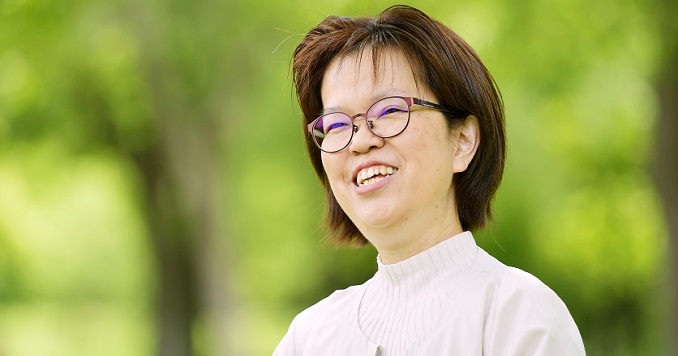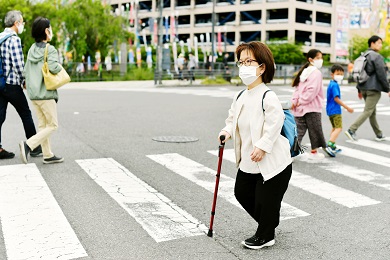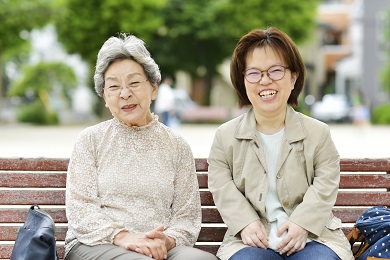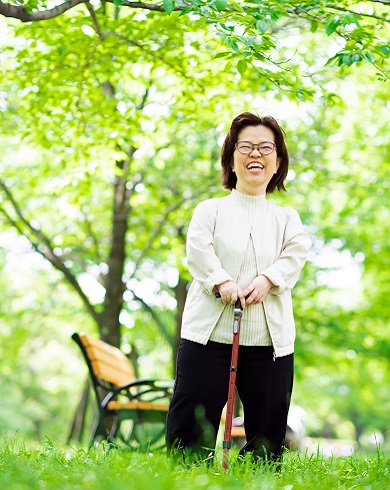One and Only Me
Kyoko Matsuda, Japan

[© Seikyo Shimbun]
Kyoko Matsuda, from Japan, is 123cms tall and used to dread the eyes of others on her whenever she was in public. Now things are different. Born into a family practicing Nichiren Buddhism, Kyoko was diagnosed with a growth disorder in elementary school. She shares her story of how she was able to transform her feelings of despair into a new sense of freedom.
I used to feel uncomfortable when people would tell me "You are so bright" or "You are amazing." When people said such things to me, I felt that the underlying message was, "Although you are short . . ." This made me want to change my appearance. But now, I feel differently. Through interacting with others, I have gained confidence in who I am.
When I was in elementary school, during a sports day event when it was my turn to run in a footrace, my teacher took me halfway to the finish line so that I started way ahead of the other children. I remember feeling discouraged. When the race began, I ran and kept the lead until the end. However, when I looked toward my teachers and friends, their expressions showed a mixture of conflicted emotions. I thought, "This first place win doesn't count." I remember feeling lonely despite the lively, bustling event. At school, I was also a target of bullying and that made me keep my head down so that people would not notice me.
I got tired of receiving praise whenever I achieved something because it always seemed to carry an undercurrent of pity. When people praised me all I would hear was, "With that kind of body, what you did was amazing." I knew it was unintentional, but I felt that people looked at me with prejudiced eyes. I became pessimistic. I would be lying if I said I didn't care about my appearance. I just wanted to grow taller, to be an ordinary person like everybody else. The reality, however, was that I was stared at every day, wherever I went. The voices of curious children commenting on my height or asking their parents "Why is she so small?" would sting. It was heart wrenching to hear parents say, "Don't look at her." I pretended that I couldn't hear what was being said. Whenever I saw a child or felt their gaze, I tried to avoid them and physically removed myself.
I would be lying if I said I didn't care about my appearance. I just wanted to grow taller, to be an ordinary person like everybody else.
When I started working, I had to ask others to help me with certain tasks, such as handing me documents I couldn't reach. Each time, I would apologize for interrupting their work and bow, saying, "I'm sorry." It was miserable.
When I saw people with disabilities on the street, I kept my distance from them. As time went by, I became attached to the idea of "normal." I didn't want people to think that I was the same as other disabled people.

[© Seikyo Shimbun]
One day, when I was 20 years old, I was at a Soka Gakkai center and a woman who was in a wheelchair approached me. She asked if I had heard of the Soka Gakkai's Freedom Group. It is a group for people with disabilities. I had never heard of it.
I decided to attend one of their meetings and was struck by how energetic everyone was. What also amazed me was their ability to share lighthearted jokes about their disabilities without resorting to self-deprecation.

Kyoko with her mother [© Seikyo Shimbun]
I was deeply impressed by the participants. Some were severely disabled and spent hours preparing for and traveling to and from the meeting. I could really sense the joy that surrounded them and how much they truly respected and understood each other. I felt like it was because they accepted and acknowledged their disabilities.
I had been bound by the idea of changing my appearance and hadn't been able to accept myself. However, through participating in the Freedom Group, I realized that I am perfectly fine the way I am. I started to look forward to the future and felt like I could finally move forward.
It was through engaging with Soka Gakkai members that I learned to value myself and regain trust and respect for others. I felt I was getting back in touch with feelings that had been eroded during my painful childhood.
Finding Freedom Together
In 2004, I was appointed as a young women's leader in the Freedom Group. This gave me the opportunity to support other Soka Gakkai members with disabilities.
Even though I sometimes assumed I understood what it felt like to have a disability, I realized that each person with a disability feels the harsh reality of society differently. There were moments when I felt I didn't know how to encourage people. I didn't know what to say. I thought about my senior in faith whose presence always made me smile when I was feeling down. I remember her once telling me: "You can't just be silent. Everyone is looking for something. Just let them know sincerely that you are there to strive alongside them. You don't have to try to say nice things." I wanted to become like her.

[© Seikyo Shimbun]
I began writing letters to encourage other members and signed them "Tiny Kyoko" with the determination to enjoy my life and utilize my body to its fullest.
Nichiren writes, "Each thing—the cherry, the plum, the peach, the damson—in its own entity, without undergoing any change, possesses the eternally endowed three bodies" [i.e., the qualities of a Buddha]. I wanted to convey this message to others—You and I are both precious just as we are, and we have the potential to shine.
I've encountered a lot of people in my 10 years as a leader. Some of them have passed away, but I have been moved by their attitude toward life until the end. Many people have been encouraged by them. I hope that I, too, can be a role model like them.
I have stopped apologizing for my disability and no longer say "I'm sorry" all the time. Rather than apologizing when I need assistance, I want to proudly show my gratitude by saying "Thank you." I used to feel sorry all the time, but now I naturally feel appreciation. As a result of participating in Soka Gakkai activities, I have transformed my life. I can proudly announce "Tiny Kyoko is here!"
Today, I still feel people staring at me, however, it doesn't bother me. When little kids ask about my body, I reply, "It will be a long story" and laugh.
Adapted from an article in the May 16, 2022, issue of the Seikyo Shimbun, Soka Gakkai, Japan.